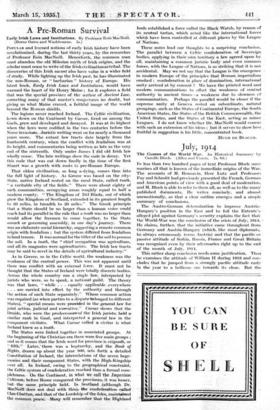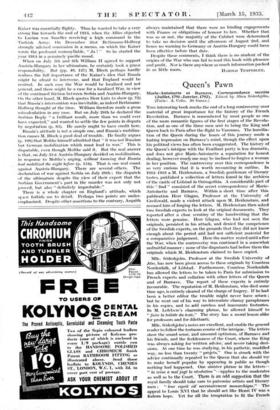July, 1 914 The Causes of the World War. An Historical
Summary by Camille Bloch. (Allen and Unwin. 78. 6d.) IN less than two hundred pages of text Professor Bloch sum- marizes all that is known of the immediate origins of the War. The accounts of M. Renouvin, Herr Lutz and Professors Fay and Schmitt had previously presented the French, German and American points of view with a good deal of moderation, and M. Bloch is able to refer to them all, as well as to the many published documents. He writes concisely, and almost unemotionally, so that a clear outline emerges and a simple summary of conclusions.
The Austro-German determination to improve Austria- IIungary's position in the East and to foil the Entente's alleged plot against Germany's security explains the fact that the World-War was the conclusion of the crisis of July, 1914. He claims, further, that the initiative came throughout from Germany and Austria-Hungary (which, like most diplomats, he always erroneously terms Austria) and that the pacific or passive attitude of Serbia, Russia, France and Great Britain was recognized even by their adversaries right up to the end of the month of July, 1914.
This rather sharp conclusion needs some justification. Thus he examines the attitude of William II during 1913 and con- cludes that he jumped from a strongly pacific attitude early in the year to a bellicose one towards its close. But the
Kaiser was essentially flighty. Thus he wanted to take a very strong line towards the end of 1913, when the Allies objected to Lucian von Sauelles receiving • e high command in the Turkish Army. On December 31st Bethmann-Hollweg strongly advised concession in a mertio. on which the Kaiser wrote the profound monosyllable, " Ja ! " So he started the year 1914 in a genuinely pacific mood. When on July 5th and 0th William II agreed to support Austria-Hungary in her ultimatum, he certainly took a grave responsibility. But (pp. 49, 127) M. Bloch perhaps hardly realizes the full importance of the Kaiser's idea that Russia might he afraid to intervene, and that England would be neutral. In such case the War would be localized and not general, and there might he a case for a localized War, in view I If the continued friction between Serbia and Austria-Hungary. On the other hand, M. Bloch quotes Herr Lutz to show (p. 72) that Russia's intervention was inevitable, as indeed Bethmann- Hollweg thought at the time. William therefore made a gross miscalculation in any case. But on July 28th he declared the Serbian Reply "a brilliant result, more than we could ever have expected," and wanted to settle the few, points in dispute by negotiation (p. 83). He surely ought to have credit here. Russia's attitude is not a simple one, and Russia.'s mobiliza- tion causes M. Bloch a good deal of trouble. He finally argues (p. 108) that Moltke himself admitted that " it was not Russian hut German mobilization which must lead to war." This is disputable, even though Moltke said it. But the real answer is that, on July 31st Austria-Hungary decided on mobilization, in response to Moltke's urging, without knowing that Russia had mobilized the night before (p. 154). That is one real count against Austria-Hungary. There are several others. The declaration of war against Serbia on July 28th; the dispatch of the .ultimatum despite the view of their expert that the Serbian Government's part in the murder was not only not proved, but also "definitely improbable."
There is a' whole chapter on England's attitude, which sae forbids me to detail. Perhaps two points are Under- emphasized. Despite other assertions to the contrary, Asquith
always maintained that there were no binding engagements with France or obligations of honour to her. Whether that was so or not, the majority of the Cabinet were determined to take no decision until the afternoon of August 2nd, and hence no warning to Germany or Austria-Hungary could have been effective before that date.
Despite these comments, I think there is no student of the origins of the War who can fail to read this book with pleasure and profit. Nor is there anywhere so much information packed in so little room.
HAROLD TEMPERLEY.











































 Previous page
Previous page